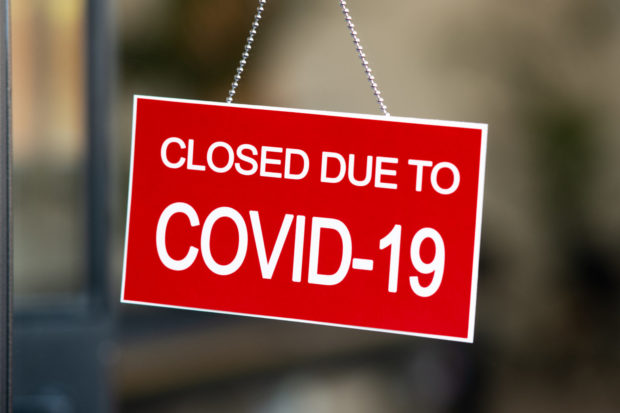The upcoming anniversary of COVID-19 shutdown orders may reveal whether a significant number of policyholders have been waiting on the sidelines before suing their insurers for business-interruption losses.
Holding off on legal action may make sense, as insurers are winning four out of five initial trial court rulings. Insurers are likely to be more willing to negotiate if they start losing, the thinking goes.
On the other hand, attorneys have been advising policyholders to carefully read their commercial property policies and look for notice-of-loss and suit-limitation provisions.
The first statewide COVID-19 stay-at-home order was imposed on March 19 by California. State, county and city orders followed around the nation in the ensuing few weeks.
“Some policies require suits relating to coverage denials be filed within a certain period of time—sometimes even within one year of the loss—so policyholders must be vigilant in assessing whether they need to file a claim, file a lawsuit, or enter into a tolling agreement with the insurer extending the suit limitation period to preserve their rights,” the Taft law firm said in a Feb. 12 post.
A COVID-19 litigation tracker posted by the University of Pennsylvania’s Carey Law School indicates there was a slight uptick in case filings in late January and February, but the tracker is about a month behind in tracking individual case filings.
As of Feb. 7, 1,501 COVID-related property claims had been filed. The number of new filings bottomed out during the week of Jan. 4, when only two lawsuits were filed. The next week, seven new cases were filed, then 10, then 11, and 11 again during the week starting Feb. 1.
Law professor Tom Baker, who maintains the law school’s litigation tracker, said he hasn’t observed any further increase since then. “FYI, many policies have a two-year deadline,” he said in an email Wednesday.
Baker said even the uptick in January and February may disappear as more data is obtained and reconciled. Some of the “new” cases are actually cases that were removed to federal courts from a state court and have already been counted once, he said. Also, the new cases may turn out not to be COVID coverage cases after further review.
Lex Machina also tracks litigation against insurers, but only in federal courts. Data relations manager Rachel Bailey said there were 1,527 federal lawsuits filed for business-interruption losses in 2020 compared to 463 in 2019 and 405 in 2018. She said 185 business-interruption lawsuits were filed in federal courts from Jan. 1 to March.
“That’s pretty steady with what we’ve seen since 2020 Q2, so there doesn’t appear to be a rush before the deadline yet,” she said in an email.

But Pamela Hans, a managing shareholder in Philadelphia for Anderson Kill, said policyholders shouldn’t assume they have more time.
“Frankly, assuming that you have only a year to sue is the prudent course of action,” she said. “Nobody is going to say you sued too soon.”
Hans said insurance policies have various deadlines to file the first notice of loss and differ on when the clock starts kicking, as well. Some policies require action from a certain time after the date of loss, while others start counting down on the date the insurer makes a decision. She said policyholders need to study the document and make sure they understand exactly what is required.
Hans said “if history is any indication,” she expects a significant number of new cases to be filed before the first-year anniversary of pandemic related public health orders that restricted the use of commercial properties. Typically there is a surge in litigation just before the first anniversary of a major storm, she said.
Others share her caution. Davis & Gilbert in New York City, Millin & Millin in McAllen, Texas and Jones Day in Los Angeles are among law firms that have posted notices about potential COVID-19 claim filing deadlines in recent months.

James Sullivan, a partner with the Calfee law firm in Cleveland, told the Claims Journal last month that his firm had not filed any lawsuits for business-interruption coverage so far. He said insurers won’t even negotiate such claims, so it makes more sense to wait for appellate court rulings that dampen their intransigence.
Contacted last week, Sullivan said in an email that his firm has checked and found that none of its clients have a one-year limitation of action clause in their policies.
Calfee did find policies with two-year limitation periods. Sullivan said policyholders can extend those deadlines by entering into an agreement with their insurers to toll the time limits.
“It will be interesting to see if insurance companies will agree to do that,” he said. “I assume many will, while others may perceive an advantage in taking a harder line on the issue and force policyholders to either file a lawsuit or abandon their potential claims.”
If policyholders can wait, the state of play may encourage them to hold off awhile longer. According to the Carey Law School litigation tracker, insurers have won on motions to dismiss or for summary judgment in 177 cases heard so far, while policyholders won only 44 early rounds.
Policyholders did better when they were able to keep their lawsuits in state courts. There the score is 23-21 in favor of insurers in early rounds.
Some policyholder attorneys are in no hurry to get to the courthouse.
“A lot of businesses in the entertainment industry are going to wait and see how these cases play out before they decide whether to invest in coverage litigation,” Greenberg Glusker partner Jonathan Sokol told the Hollywood Reporter for an article on Jan. 11. “There could be 20 to 30 decisions at the trial court level that all go in favor of the insurer, and if there’s one appeal that goes in favor of the policyholder, then the others don’t matter.”
*This story ran previously in our sister publication Claims Journal.





















 Is Risk the Main Ingredient in Ultra-Processed Food?
Is Risk the Main Ingredient in Ultra-Processed Food?  Reinsurance Program Could Wipe Out Need for Calif. FAIR Plan: Legal Exec
Reinsurance Program Could Wipe Out Need for Calif. FAIR Plan: Legal Exec  The Future of HR Is AI
The Future of HR Is AI  AI Claim Assistant Now Taking Auto Damage Claims Calls at Travelers
AI Claim Assistant Now Taking Auto Damage Claims Calls at Travelers 









